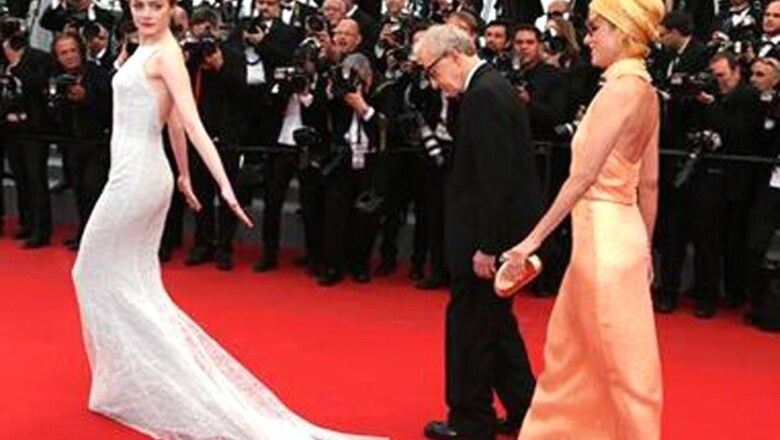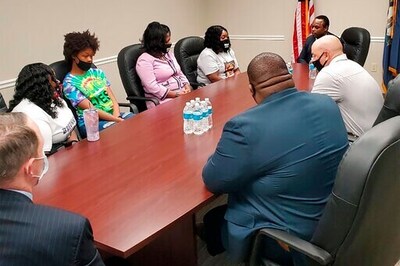
views
Cannes: This year's Cannes Film Festival is about halfway through, but one thing is already clear: This festival belongs to les femmes.
From the word go, this year's Cannes has been dominated by women and debate about gender equality in the movie industry. Yearly topics regularly grip the festival, raging through the Cannes cacophony like wildfire. But this year's near all-consuming conversation has had more the feeling of a rising sea change, one gathering for years and now swelling from a growing chorus of frustration.
"You hope it's not the year, that it's not some sort of fashionable moment," said Cate Blanchett, whose `50s lesbian romance 'Carol' has been one of the festival's unanimous sensations. "It's important to keep talking about it," she added. "It fell off the agenda and I think we lost a lot of ground."
Cannes, in its 68th festival, is in some ways an unlikely place for an explosion of attention to sexism. A swanky French Riviera spectacle of high-heeled glamour and ambitious cinema, Cannes has sometimes been criticized for a lack of female directors in the Cannes Palme d'Or competition, the illustrious highest rung of the festival where about 20 films premiere. When no female directors were in competition a few years ago, some protested and a signed petition calling for change was published.
The festival's defense has typically been that it can only program the films that get made, and that anger should be directed at the industry: studio executives and independent film producers.
This year, though, Cannes appeared to take a deliberate step toward leading the conversation. It opened the festival with a movie directed by a woman: the delinquent drama 'Standing Tall' by Emmanuelle Bercot. Two woman directors entered the competition: Valerie Donzelli's 'Marguerite & Julien' and 'My King' by French actress-director Maiwenn.
"People keep referring to women here, women there," Maiwenn said. "We aren't chosen because of our gender or this or that. We're chosen because of our film."
An honorary Palme d'Or is to be given to French New Wave filmmaker Agnes Varda. Even this year's official poster, which covers the festival's hulking center, the Palais des Festival, is Ingrid Bergman.
Several panels have also been held on women in film, where Salma Hayek, Jane Fonda, producer Megan Ellison and others have spoken about their experiences.
"Cinema undermines women's intelligence," said Hayek, who stars in Italian director Matteo Garonne's competition entry 'The Tale of Tales.' "They don't see us as a powerful economic force. It's incredible ignorance. Hollywood doesn't have this business vision."
Yet the biggest Hollywood films at Cannes - George Miller's road-raging explosion 'Mad Max: Fury Road' and Pixar's cerebral growing up tale 'Inside Out' - are both notable for being big summer blockbusters led by female characters. Though the film's name goes to Tom Hardy's Mad Max, Charlize Theron's Furiosa is the driver of 'Fury Road,' while 'Inside Out' is set in the mind of a young girl.
Each film played out of competition but both drew the heartiest, most gushing responses at Cannes: 'Fury Road' for its relentless action-movie bravado and 'Inside Out' for its thoughtful, tender story.
The practically universal acclaim of those films could be seen as a bright sign for Hollywood or a signal of a weak competition lineup to this year's festival. The first week of Cannes, which concludes Sunday with the presentation of the Palme d'Or by Joel and Ethan Coen's jury, has been largely defined by so-so entries and a handful of fantastical oddities.
Garrone's 'The Tale of Tales,' based on influential but little-known Neapolitan fairy tales, summoned a grotesquely fantastical world of kings and princesses, giant fleas and massive ogres. The Greek director Yorgos Lanthimos presented 'The Lobster,' a deadpan satire of the social pressure to marry, played out at a remote Irish hotel where unmatched singles are turned into the animal of their choice.
But 'Carol,' Todd Haynes' adaptation of Patricia Highsmith's 1952 novel about an illicit love in conservative `50s New York, bowled over the festival with its sumptuous photography. The film, in which Rooney Mara co-stars, could be in the hunt for both Oscars and the Palme, as could Laszlo Nemes' equally formalist Holocaust drama, 'Son of Saul.' The Hungarian filmmaker's debut plunges the viewer into the horrific world of a Jewish prisoner forced to help operate a death camp.
Both films exhumed painful periods of another time, nevertheless containing their own vital relevance. 'Carol' offered both a chance to reflect on how far society has come in six decades, but also how much more ground still needs to be covered.
"Nothing has changed and everything has changed," said screenwriter Phyllis Nagy. "We can have this movie now."




















Comments
0 comment